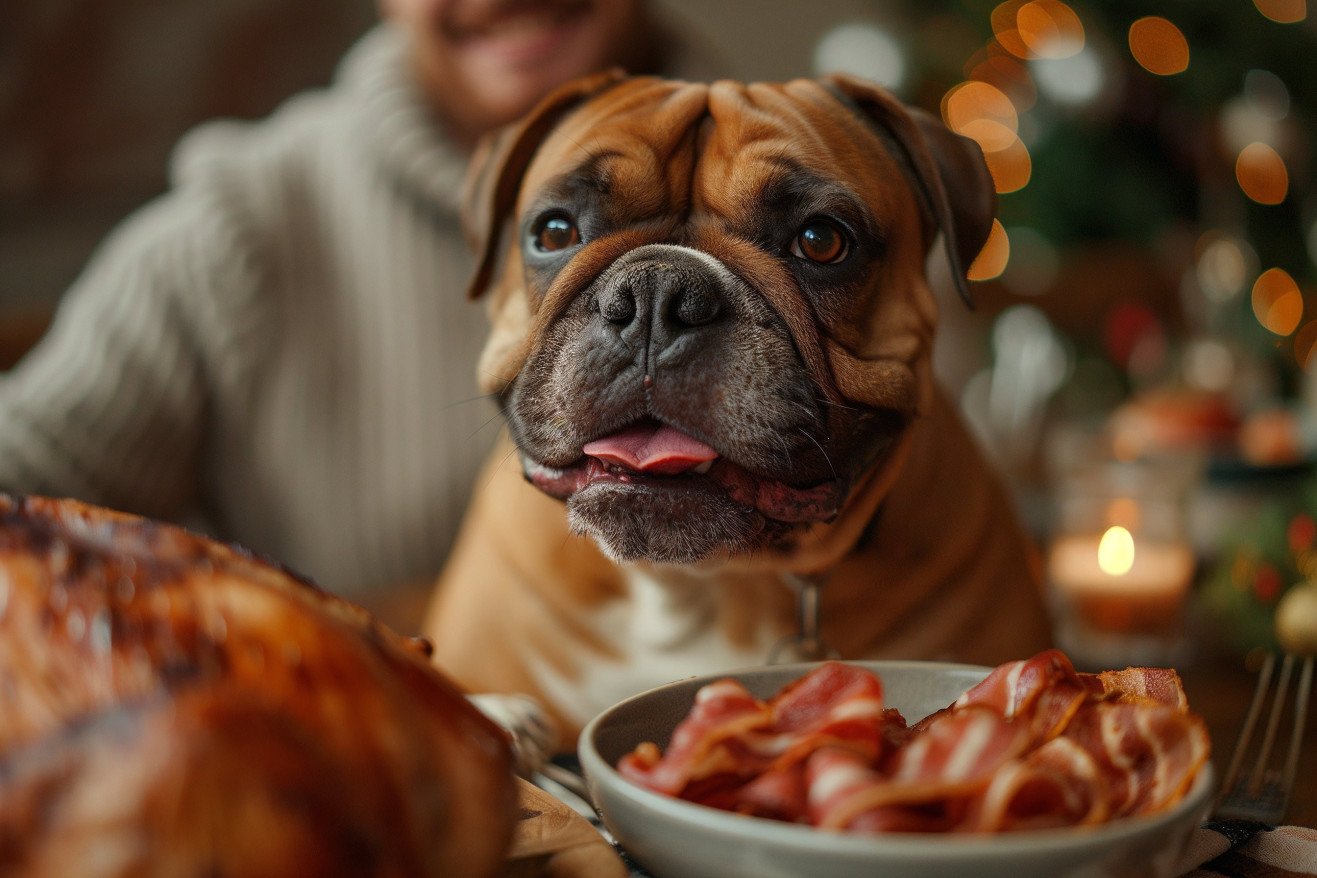Can Dogs Eat Turkey Bacon? Evaluating Safety and Nutrition
15 February 2024 • Updated 14 February 2024

You may think that turkey bacon is a healthier option, but can your dog have it? Turkey bacon can be given to dogs in small amounts as an occasional treat. While turkey bacon is lower in fat than pork bacon, it still has a high sodium content. It should always be cooked with no added oils or seasonings and should be given in moderation.
This article will dig into the most recent research in veterinary nutrition and studies of canine nutrition to explain whether or not turkey bacon can be part of a healthy dog diet. We will also look at the bigger picture of occasional treats, the impact of sodium on dogs, and the nutritional requirements that determine a healthy dog treat.
By breaking down this research, we hope to give you the information you need to make the best choices for your dog’s treats.
Can dogs eat turkey bacon?
The Role of Treats in Your Dog’s Diet
Treats play a role in your dog’s diet that goes beyond rewarding good behavior. They can also be used as part of a training regimen and as a supplement to your dog’s regular meals.
As the American Kennel Club points out, it’s important to think of treats as a supplement to your dog’s regular diet, and they should make up no more than 10 percent of your dog’s daily caloric intake.
This is especially important to keep in mind when it comes to the ‘10-percent rule’ because it can help ensure that treats don’t lead to obesity and that they don’t replace the essential nutrients that your dog needs to get from their regular diet.
The psychological and behavioral roles of treats are also important. They can be used to strongly reinforce positive behavior, improve mood, encourage desirable behaviors, and strengthen the bond between you and your dog. However, it’s important to make sure that you’re giving treats like turkey bacon in a way that’s in line with the recommended frequency and serving sizes to make sure that your dog doesn’t overindulge.
Responsible treat-giving also means choosing treats that are made from high-quality ingredients, as Pawsitively Pure Dog Food points out. This means that it’s important to make sure that the treats you give your dog contribute to their overall health and well-being, especially when it comes to treats that are higher in sodium, like turkey bacon.
By doing this, you can make sure that treats are a positive addition to your dog’s diet and that they don’t negatively impact their health, which can help set the stage for a deeper understanding of how specific ingredients, like sodium, can affect your dog’s health.
How Sodium Affects Dogs
Sodium is an important electrolyte that helps regulate the amount of water in a dog’s body and aids in the proper function of nerves and muscles. That said, while sodium is necessary, it’s also important to make sure that dogs don’t consume too much of it. Too much sodium can cause high blood pressure and exacerbate heart disease, especially in older dogs and those with kidney disease, according to Hill’s Pet.
Veterinary nutritionists stress the importance of maintaining the right level of sodium in a dog’s diet. While some dogs may be able to handle different levels of sodium, it’s important to avoid high-sodium processed foods like turkey bacon, which can lead to an unhealthy spike in sodium levels.
According to the American Kennel Club, excessive sodium can lead to salt toxicosis or hypernatremia, which can cause the brain and nervous tissue to swell, potentially leading to life-threatening health issues.
To help make sure that dogs maintain a healthy level of sodium, experts suggest that dog owners provide low-sodium treats and make sure that dogs always have access to fresh water, which can help flush out excess sodium. By providing treats that are naturally low in sodium, dog owners can help make sure that their dogs maintain a healthy level of sodium and support their overall health and well-being.
How to Supplement a Dog’s Diet With Healthy Treats
A dog’s diet must meet the six essential nutrient categories for optimal health, including water, proteins, fats, carbohydrates, vitamins, and minerals, according to the ASPCA. In this context, it’s important to think about how treats like turkey bacon fit into a dog’s diet. While turkey bacon can be a source of protein, it doesn’t provide the well-rounded nutrition that dogs need and can throw off their diet with its high sodium content.
To find healthier treats, look for options that provide additional nutritional value that aligns with a dog’s dietary needs. Some examples of better treats include lean meats, vegetables, or dog treats that are formulated to be low in sodium and high in nutrition. These options will help provide more of the nutrients that are essential to a dog’s diet, which PetMD says will help support a dog’s health.
When choosing treats, look for options that will help supplement your dog’s diet and avoid those that are high in sodium or don’t provide essential nutrients. As VCA Animal Hospitals suggests, look for treats that will help supplement a well-balanced diet that’s tailored to your dog’s age and activity level.
Look for treats that will help supplement your dog’s diet and make sure that they’re helping your dog’s overall health rather than hurting it. This will help you build a healthy eating plan that you can continue throughout your dog’s life.
Can Dogs Eat Turkey Bacon?
Veterinarians and animal nutritionists say that while turkey bacon is healthier than pork bacon, it still has the potential to be harmful to dogs. As Hepper explains, turkey bacon should follow the 10-percent rule, which means that it should make up no more than 10% of a dog’s daily caloric intake.
Even though it is a source of protein, the high sodium content in turkey bacon can lead to health problems like pancreatitis, obesity, and heart disease if it’s given to dogs on a regular basis.
Both Dope Dog and A-Z Animals say that turkey bacon should be given to dogs in moderation. The recommended serving size is usually between half a slice and a full slice, and it should be given no more than two to three times per week. This is especially important for dogs with health issues that are sensitive to sodium, like high blood pressure and kidney problems.
In short, dogs can eat turkey bacon as an occasional treat, but it’s important to be mindful of its nutritional content and to give it to dogs in moderation. For dog owners who are worried about the potential health risks, there are plenty of safe, low-sodium, high-quality commercial treats on the market.
It’s important to make sure that turkey bacon is only given to dogs as an occasional treat and not as a regular part of their diet to ensure that they’re eating a well-balanced diet that supports their overall health.
The Role of Processed Foods in Canine Nutrition
Processed foods are an increasingly common part of the modern dog’s diet, but their impact on health is a growing concern.
Turkey bacon, a processed meat, is a prime example of the potential dangers of these foods.
Studies have shown that dogs who eat a diet high in processed foods may be at risk for a number of health problems, including obesity, diabetes, and even certain types of cancer.
Vince the Vet notes in his blog that ultra-processed kibble and canned food, which can be low in meat and high in carbohydrates, can lead to issues like pancreatitis because of their high levels of starch.
The FDA has backed up this concern with its investigation into a possible connection between certain diets and canine dilated cardiomyopathy (DCM). The organization has studied cases in which dogs who were fed diets that were high in peas, lentils, and potatoes, which are often marketed as “grain-free,” developed DCM.
While a cause has not been determined, the FDA recommends a well-balanced diet for dogs, which may suggest that highly processed foods could be a factor.
As a result, more and more experts are recommending whole foods and diets that are minimally processed for dogs.
These diets are more in line with the way dogs eat in the wild and are less likely to contain the additives and imbalances that come with heavy processing.
Pet parents can make the switch to healthier options by adding freshly prepared meats and vegetables to their dogs’ diets, which can provide the balanced nutrition that comes without the downsides of heavy processing.
When it comes to giving dogs processed treats like turkey bacon, it’s important to make sure that they’re given in moderation and that they’re being added to a diet that’s already well-balanced.
In Summary: Turkey Bacon and Your Dog’s Diet
In this article, we have taken a deep dive into the ins and outs of feeding your dog turkey bacon, noting that while it is lower in fat than pork bacon, it is also high in sodium. As with all treats, the key is moderation, and this is especially true with turkey bacon, which should only be a very small part of your dog’s diet.
To make sure we are keeping our dogs as healthy as possible, we have also talked about the importance of balancing treats with the rest of your dog’s nutritional intake and the importance of finding alternatives that don’t come with the high sodium levels.
We have also talked about the bigger picture of how processed foods can impact a dog’s health and the importance of moving to a diet that is made up of whole, minimally processed foods.
In the end, the bottom line is that while turkey bacon is okay in small amounts, it should not be a regular part of your dog’s diet. Regular check-ins with your vet will help you get personalized dietary recommendations based on your dog’s specific health needs.
In the end, the goal is to make sure your dog is getting a well-balanced diet that includes all of the essential nutrients they need for a long and healthy life.


